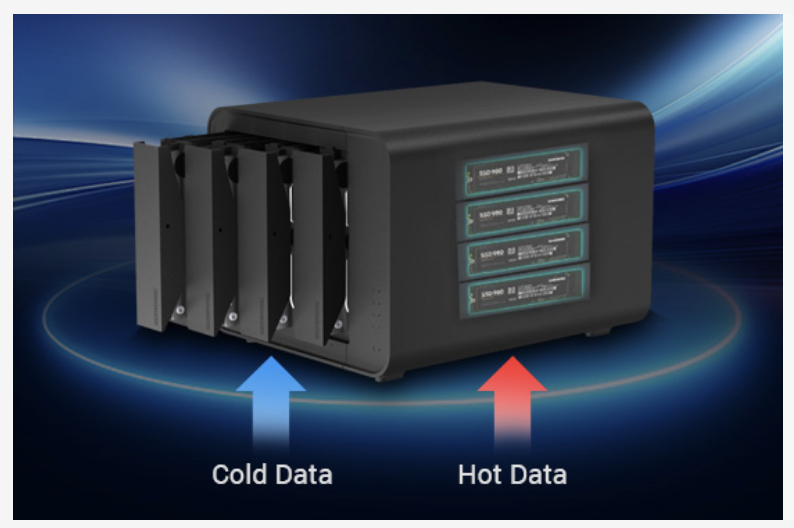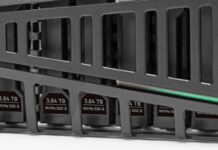SaaS backup startup Alcion founder and CEO Niraj Tolia tweets: “Let me be blunt. On-prem backup is an evolutionary dead end, especially for SaaS services like Microsoft 365.”
…
AWS announced GA of Amazon Q, a generative AI-powered assistant for accelerating software development and leveraging companies’ internal data. It generates highly accurate code, tests, debugs, and has multi-step planning and reasoning capabilities that can transform (e.g. perform Java version upgrades) and implement new code generated from developer requests. It also makes it easier for employees to get answers to questions across business data such as company policies, product information, business results, code base, employees, and many other topics by connecting to enterprise data repositories to summarize the data logically, analyze trends, and engage in dialog about the data.
AWS is also introducing Amazon Q Apps, which enable employees to build generative AI apps using their company’s data. Employees simply describe the type of app they want, in natural language, and Q Apps will quickly generate an app that accomplishes their desired task, helping them streamline and automate their daily work with ease and efficiency. Learn more about Amazon Q here.
…
Cryptographer Baffle announced capabilities that allow organizations to secure structured and unstructured data when moving to and across the cloud. It protects information at the field level for unstructured, semi-structured, and structured files. Access control actively enforces compliance with privacy regulations at the endpoint of the receiving system. Baffle can be customized to protect information in non-standard file formats including PDF, CSV, Parquet, JSON objects, and more.
…
CData’s new ETL/ELT SaaS tool, CData Sync Cloud, is now live. It brings CData Sync’s 300-plus standardized data drivers to the cloud, embedding directly into companies’ products to power data integrations.
…
Data engine supplier Cribl has signed a Strategic Collaboration Agreement (SCA) with Amazon Web Services to make it easier for customers to manage the growing influx of IT and security data. The SCA enables:
- Further development of Cribl.Cloud on AWS, accelerating customers’ use of Cribl’s vendor-agnostic solutions to collect, process, route, and analyze IT and security data with their sources and destinations of choice.
- Go-to-market expansion with AWS to deliver solutions that address growing data challenges and drive greater efficiency.
- Global growth initiatives to support the expansion of Cribl into new regions, including Europe, Australia, and New Zealand.
- Continued innovation with AWS to give customers freedom through its integration with Amazon Security Lake and showcasing Cribl Search capabilities.
…
Quantitative trading firm Jump Trading is using DDN SFA 400NVX2 arrays with NVMe QLC flash storage in its HPC infrastructure to support its AI and ML capabilities for competitive advantage in global financial markets. Watch a video about it here.
…
Everspin’s PERSYST EMD4E001G 1 Gb STT-MRAM is used by IBM in its 4th generation FlashCore Modules. It ensures data integrity during power loss. With a DDR4 interface, it delivers 2.7 Gbps of both read and write bandwidth, coupled with instant non-volatility.
…
An HPE report, Architect an AI Advantage, which surveyed more than 2,000 IT leaders from 14 countries, found that while global commitment to AI shows growing investments, businesses are overlooking key areas that will have a bearing on their ability to deliver successful AI outcomes – including low data maturity levels, possible deficiencies in their networking and compute provisioning, and vital ethics and compliance considerations. The report also uncovered significant disconnects in both strategy and understanding that could adversely affect future return on investment.
…
IBM has released Storage Scale v5.2.0 enhancing its hybrid cloud credentials by adding cloudkit, an interactive guided CLI for multi-cloud provisioning. Cloudkit offers a composable deployment architecture with:
- One-click upgrade of clusters created on Amazon Web Services (AWS) or Google Cloud Platform (GCP).
- Support for AFM-COS on AWS.
- IBM Storage Scale deployment on Azure (preview)
- AFM-COS support on GCP (preview)
- Create multiple file systems on AWS (preview)
- Fleet (also known as rapid expansion) on GCP (preview)
Check here for a summary of changes.
…
Nasuni says analyst firm DCIG has named the Nasuni File Data Platform a “Top Five Performer” in two enterprise reports: Enterprise Hybrid Cloud SDS NAS Solutions and Enterprise Multi-site File Collaboration Solutions. They highlight Nasuni’s native hybrid cloud architecture, fast file and object access, data security and ransomware protection, and its add-on services. Nasuni says it has had a year of strong momentum for the leading hybrid cloud provider, including 46 percent growth in new customers and 120-plus new large enterprise customers in FY23.
…
NetApp released its second annual Cloud Complexity Report, which found a clear divide between AI leaders and laggards across several areas including:
- Regions: 60 percent of AI-leading countries (India, Singapore, UK, USA) have AI projects up and running or in pilot, in stark contrast to 36 percent in AI-lagging countries (Spain, Australia/New Zealand, Germany, Japan).
- Industries: Technology leads with 70 percent of AI projects up and running or in pilot, while Banking & Financial Services and Manufacturing follow with 55 percent and 50 percent respectively. However, Healthcare (38 percent) and Media & Entertainment (25 percent) are trailing.
- Company size: Larger companies (with more than 250 employees) are more likely to have AI projects in motion, with 62 percent reporting projects up and running or in pilot, versus 36 percent of smaller companies (with fewer than 250 employees).
“The rise of AI is ushering in a new disrupt-or-die era,” said Gabie Boko, NetApp CMO. “Data-ready enterprises that connect and unify broad structured and unstructured data sets into an intelligent data infrastructure are best positioned to win in the age of AI.”
…
Fred Chen tweets that Nuocun Microelectronics (NORMEM), a semiconductor company based in Suzhou, China, has developed the first 3D NOR flash memory prototype chip. It uses layering processes like 3D NAND and is patented as CN105870121A. It provides random access to data and is claimed to cost a third of the price of planar NOR, and can compete with NAND.
…
HCI software vendor Nutanix’s sixth annual global Public Sector Enterprise Cloud Index (ECI) survey and research report showed that Public Sector IT leaders expect substantial near-term adoption of multiple IT operating models (87 percent) yet current usage (57 percent) is slightly behind the average compared to other industries (60 percent). The use of hybrid multicloud models in the industry is forecast to quadruple over the next one to three years as IT decision-makers at public sector organizations look to modernize datacenters into private clouds and preserve choice in public cloud deployments.
…
Panmnesia is going to demonstrate the interoperability of its CXL IP with CXL-enabled CPUs from major CPU vendors at the inaugural CXL DevCon next week. It’s also planning to attend an official CXL compliance test event in the near future to prove the functionality of its CXL IP product, which supports all the features of the latest CXL specification and maintains backward compatibility with previous versions. Panmnesia’s Chief Strategy Officer (CSO), Miryeong Kwon, will present state-of-the-art CXL switch-based solutions for next-generation datacenters. After that, Kwon will introduce another CXL switch technology at the OCP (OpenComputeProject) meeting hosted at Meta’s Sunnyvale campus.
Panmnesia has designed its CXL switch to incorporate sophisticated software known as the fabric manager to enable configurable connectivity to allow users to scale their CXL system effortlessly. Kwon said: “Panmnesia’s CXL switch technology will be crucial for optimizing the efficiency of big data services such as generative AI.”
…
Open source database supplier Percona announced Liz Warner as CTO. She was previously CTO at Kubernetes management company Weaveworks, and has held tech leadership positions with Nationwide, 10x Future, and Toyota Connected Europe. She has also led development and technology teams at Mastercard and Apple. Warner’s appointment comes as Percona co-founder and long-time CTO Vadim Tkachenko steps away from the executive position to assume a new set of duties as Technology Fellow at Percona. He will focus Percona’s involvement in the Linux Foundation’s Valkey Community, the growth of vector databases, and other emerging technologies.
…
Quantum is expanding its global partnership model across South Korea, Japan, Australia, and New Zealand, building on existing coverage of other Asia-Pacific markets such as China, India, and Singapore. It has entered into exclusive distributor agreements with TS Line Systems for Korea, ACA Pacific for Australia and New Zealand, and NGC for Japan. Each already has a foundation with Quantum and knowledge of its products, with existing joint customers today.
…
Rubrik has seen its Zero Labs publish a report, The State of Data Security: Measuring Your Data’s Risk, which shows healthcare organizations experienced 50 percent more encryption events than the global average across 2023. Cloud continues to drive inherent risk and security blind spots as 70 percent of all data is typically not machine readable by security appliances. Leadership changes following cyberattacks are on the rise, with major personnel changes reported by 44 percent of organizations – up from 36 percent in 2022.
…
App HA and DR supplier SIOS Technology announced the availability of its SIOS LifeKeeper for Linux Admin training on Udemy, an online skills marketplace and learning platform.
…
Snowflake launched Snowflake Arctic, a new enterprise-grade large language model (LLM) with a Mixture-of-Experts (MoE) architecture. It features:
- Performance: Model that outperforms leading open models including DBRX, Mixtral-8x7B, and more in coding (HumanEval+, MBPP+) and SQL generation (Spider), while simultaneously providing leading performance in general language understanding (MMLU).
- Efficiency: Mixture-of-Experts (MoE) architecture that activates 50 percent or fewer tokens than comparably sized models.
- Open: Unhindered access and customization with open weights and detailed training recipes under Apache 2.0 license.
…
Enterprise data management company Syniti announced record-breaking Q1 2024 results, setting the stage for a strong year. The company reported its highest revenue in company history and saw significant year-over-year increases in both software revenue and annual recurring revenue (ARR). Service bookings were the highest recorded for Q1, up 65 percent over Q1 2023.
…
Data warehouser Teradata announced an open and connected approach to supporting open table formats (OTFs) Apache Iceberg and Linux Foundation Delta Lake, embracing the industry pivot toward open source technologies and offering customer choice in data management. It adds a new dimension to Teradata VantageCloud Lake, its cloud-native analytics and data platform for AI, as well as Teradata AI Unlimited, an on-demand and cloud-native AI/ML engine – which will move to public preview on both AWS and Azure Marketplaces beginning in Q2 2024. It says OTFs represent a significant change from proprietary data storage to more flexible storage that can be used across platforms. The vision is greater interoperability, cost efficiency, and choice.
“In today’s data landscape, we’re seeing wide adoption of open table formats with 51 percent of organizations actively adopting Delta tables and 27 percent adopting Apache Iceberg. This trend reflects the industry’s focus on a single source of data and the ability to leverage multiple engines against that data,” said David Menninger, Executive Director at Ventana Research, part of ISG.
…

TerraMaster released its D8 Hybrid, saying it’s the industry’s first hybrid HDD/NVMe SSD enclosure. It can hold 4x SATA HDDs/SSDs and 4x M.2 2280 NVMe SSDs, with a capacity of 24 TB per HDD and 8 TB per M.2 SSD, providing users with up to 128 TB of storage space. Think of it as storage expansion for Windows, Mac or Linux computers. Hot data stored on high-speed SSDs can be quickly accessed, while cold data is cost-effectively stored on HDDs. TerraMaster TPC Backupper simplifies Windows PC backups. Users can schedule folder or disk partition backups to TerraMaster USB HDD storage or NAS servers effortlessly. TPC Backupper supports incremental and differential backup strategies and is compatible with Windows 8/8.1/10/11.
D8 Hybrid adopts USB 3.2 Gen2 protocol for high-speed data transmission up to 10 Gbps. With a single M.2 SSD, the read/write speed can reach up to 980 MBps. With 2x SSDs in RAID 0, the read speed can reach 960 MBps. With 2x hard drives in RAID 0, the read/write speed can reach up to 521 MBps.
…
According to the Storage Newsletter, research house Trendfocus says prelim calendar Q1 2024 HDD supplier ship numbers were:
- Seagate: 11.5-12 million with a 39.2-39.5 percent market share, down 17.6-21 percent year-over-year
- Toshiba: 6.5-7 million with a 22.3-22.9 percent market share, up 2-9.9 percent year-over-year
- Western Digital: 11.1-11.6 million with a 37.9-38.1 percent market share, down 8.4-12.3 percent year-over-year
But Western Digital earned more revenues from HDDs in its Q1 2024 (Q3 FY 24) than Seagate.
….
Research house TrendForce says North American customers are increasing their orders for storage products as energy efficiency becomes a key priority for AI inference servers. This is driving up demand for QLC enterprise SSDs. Currently, only Solidigm and Samsung have certified QLC products, with Solidigm actively promoting its QLC products and standing to benefit the most from this surge in demand. It predicts shipments of QLC enterprise SSD bits to reach 30 exabytes in 2024 – increasing fourfold in volume from 2023.
…
The Stack newsletter says United Healthcare paid a $22 million ransom to BlackCat/ALPHV malware attackers of its Change Healthcare subsidiary, and that “the cyberattack, which took place in February 2024, halted medical payments and prescriptions across the US.” United Healthcare said the attack had cost it “$872 million in unfavorable cyberattack effects” in the first 2024 quarter. Total losses from the attack are expected to be around $1.6 billion. The attackers used stolen credentials, not protected by multi-factior authentication (MFA), to gain access to United Healthcare’s system via a Citrix portal for remote desktop access, then encrypted data after exfiltrating it. Read more in the United Healthcare CEO’s testimony to a US House of Representatives committee.
…
VergeIO announced that MSP and CSP CenterGrid has implemented VergeIO’s Ultraconverged Infrastructure (UCI) to advance CenterGrid’s service offerings, particularly in the Media and Entertainment (M&E) sector and GPU-powered workloads such as VFX and AI. VergeOS was chosen for its per-server licensing model, comprehensive networking, virtualization, storage integration, and migration capabilities from legacy infrastructure software systems.
…
Software RAID supplier Xinnor is partnering CineSys LLC, a broadcast and media SI in North America. CineSys is offering two xiRAID-based products. First, NVMe workstations for Autodesk Flame, BMD Resolve, and Adobe. VFX artists and editors will be able to write and read data from the CineSys NVMe workstation at 50 GBps writes and 70 GBps reads. The deployment aims to replace traditional local uncompressed framestores, enhancing efficiency and performance for content creators. Secondly, SAN file systems using target nodes. This setup features an iSCSI over RDMA SAN comprising two target nodes running on Supermicro 1U AMD Epyc-based PCIe 5 NVME storage. With each node equipped with 16x 7.68 TB drives, delivering 107 TB of usable space per node. With 4x 100 Gbps network links per node, the cluster achieves a performance of 50 GBps read and write per node, totaling 100 GBps read and write for the entire cluster.








